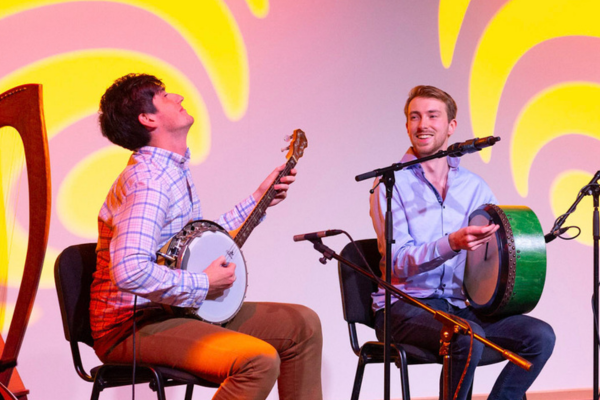
Sometimes it’s not what’s on our CVs or academic qualifications that give us that certain X Factor which propels us to success. Often, it’s simply the ability to adapt, grow and have the confidence to challenge ourselves to step outside our comfort zones.
Tyndall’s goal is to attract and nurture people with diverse talents and excellent skills, enabling all to reach their full potential.
In celebration of the many talents that make up Tyndall, we are showcasing Kevin Sewell, PhD student in Photonics Theory, and his hidden talent as a traditional Irish musician!

What is your hidden talent?
I play three instruments: tin whistle, flute and bodhrán. I play mostly in pubs but in the past, I gigged in venues across Ireland and France.
What sparked your interest?
A flier came in the letterbox in my parents’ house when I was 6 advertising tin whistle lessons. I was a slow learner, but when I started going to gigs and watching the professionals playing instruments properly, then I fell in love with the music. Watching Youtube videos of bands like Flook and Beoga had me hooked.
What is your current role (and research focus if relevant)?
I'm in the latter half of my four-year PhD. I study computational modelling, whereby I’m seeking to understand the electron-scattering processes by which electrons change their spin polarisation in time. This involves using Density Functional Theory (DFT) codes to calculate parameters that determine the scattering that results in spin-flips and exploring what combinations of strain and alloying enhance the spin-flips. The material I mostly work with is Germanium-Tin (GeSn). The aim is that electron-spin can be used as an effective new alternative logic variable that can lead to higher-performance logic devices with lower power consumption, and as an environmentalist, this prospect especially appealed to me when I applied for this PhD.

How has your hidden talent complemented your research?
Mostly, it serves as a means of escapism. If I play for several hours on a Friday night in a pub, it can be like hitting a refresh button. I could work on a Sunday if I needed to, and it would feel like I had had a full weekend off. I just lose touch with the rest of the world while I play and immerse myself in this perfect bubble of notes. Music acts as a release in so many ways. Whether you’re feeling on top of the world or you’ve had a rough day, you can release these emotions through the instruments.
What advice would you give to someone who wants to try your hidden talent?
Play with other people as much as you play alone, because music is meant to be shared. In terms of improvement, listen to people who are a bit more experienced than you are and look at what they do. But most of all, enjoy the learning curve.
Be sure to keep up with Kevin and his music on his Instagram @kevinsewell_music!
